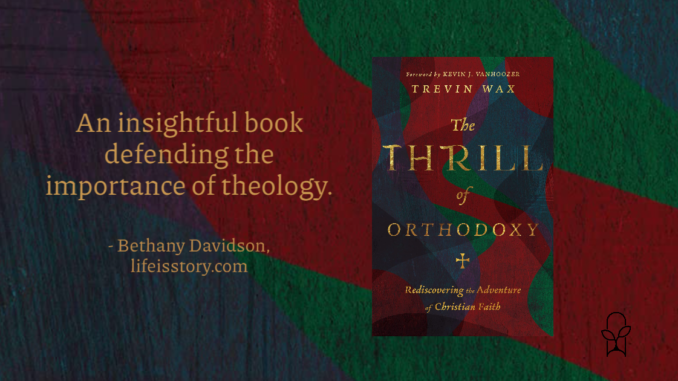
Published by IVP on November 15, 2022
Genres: Non-Fiction, Apologetics, Christian Life, Theology
Buy on Amazon
Goodreads

Every generation faces the temptation to wander from orthodoxy—to seek out the jolt that comes with false teaching, and to drift with cultural currents. And so every generation must be awakened again to the thrill of orthodoxy, and experience the astonishment that comes from stumbling afresh upon the electrifying paradoxes at the heart of the Christian faith.
In The Thrill of Orthodoxy, Trevin Wax turns the tables on those who believe Christian teaching is narrow and outdated. Returning to the church's creeds, he explains what orthodoxy is and why we can have proper confidence in it, and lays out common ways we can stray from it. By showing how heresies are always actually narrower than orthodoxy—taking one aspect of the truth and wielding it as a weapon against others—Wax beckons us away from the broad road that ultimately proves bland and boring, and toward the straight and narrow path, where true adventure can be found.
In The Thrill of Orthodoxy, Trevin Wax argues that even though Christian denominations can vary in their opinions on secondary issues, it is vital for Christians to hold fast to the orthodox tenets of Christianity. He writes about the core doctrines that Christians have held throughout the ages and in global contexts, and he compares these essentials to “load-bearing walls.” He argues that when Christians try to change these core elements of their faith to fit with modern sensibilities, they end up with something else entirely.
Wax gives examples of ways that Christians drift away from the gospel, such as avoiding hard questions, casting a sense of uncertainty over core doctrines and not just disputable matters, or caring so much about the gospel’s implications for society that the gospel itself no longer seems to matter much. He writes in a gracious way about Christians who have drifted from orthodox views, but he isn’t primarily trying to persuade them. He doesn’t engage with the whole range of arguments that they would present in response to a book like this, but focuses on people who are beginning to drift, or who are questioning why theological convictions matter.
Wax argues that God’s relational nature is precisely why theology matters so much. These aren’t just abstract propositions that educated people like to argue over. An accurate understanding of the living God is at stake, and because it matters for us to truly know and understand God, we should care about it when people misrepresent Him. Wax rightly challenges those who argue for argument’s sake, or who care so much about specific doctrines that they neglect others, but he argues well for why theology is essential to our faith. I had mixed feelings about some elements of this book, including the analogies about knights and warfare that would carry baggage about the Crusades for many readers, but I found the book very insightful and enjoyed it overall.
